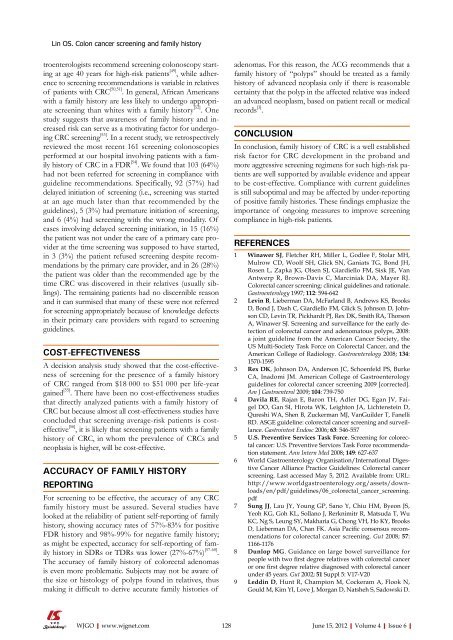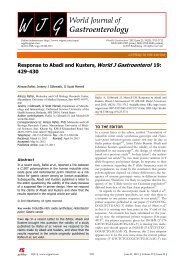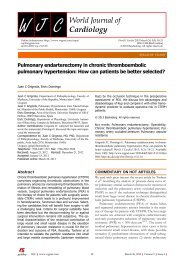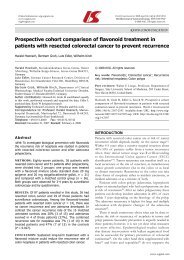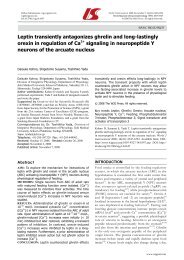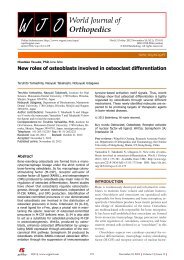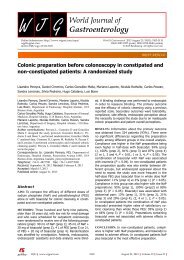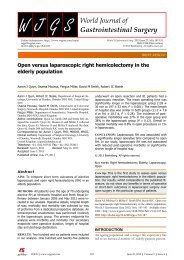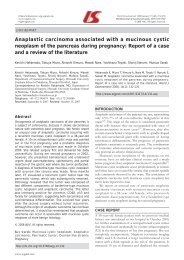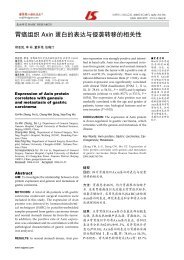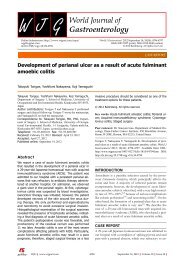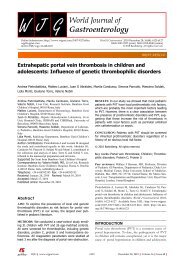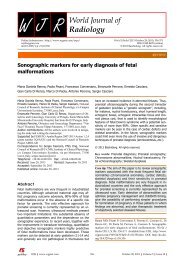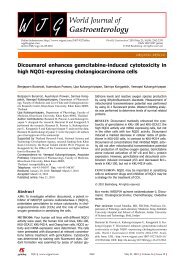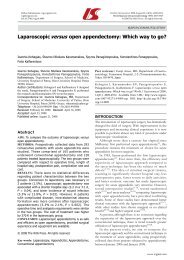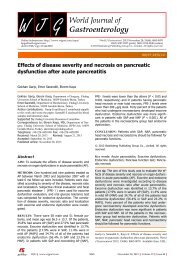6 - World Journal of Gastroenterology
6 - World Journal of Gastroenterology
6 - World Journal of Gastroenterology
You also want an ePaper? Increase the reach of your titles
YUMPU automatically turns print PDFs into web optimized ePapers that Google loves.
Lin OS. Colon cancer screening and family history<br />
troenterologists recommend screening colonoscopy starting<br />
at age 40 years for high-risk patients [49] , while adherence<br />
to screening recommendations is variable in relatives<br />
<strong>of</strong> patients with CRC [50,51] . In general, African Americans<br />
with a family history are less likely to undergo appropriate<br />
screening than whites with a family history [52] . One<br />
study suggests that awareness <strong>of</strong> family history and increased<br />
risk can serve as a motivating factor for undergoing<br />
CRC screening [53] . In a recent study, we retrospectively<br />
reviewed the most recent 161 screening colonoscopies<br />
performed at our hospital involving patients with a family<br />
history <strong>of</strong> CRC in a FDR [54] . We found that 103 (64%)<br />
had not been referred for screening in compliance with<br />
guideline recommendations. Specifically, 92 (57%) had<br />
delayed initiation <strong>of</strong> screening (i.e., screening was started<br />
at an age much later than that recommended by the<br />
guidelines), 5 (3%) had premature initiation <strong>of</strong> screening,<br />
and 6 (4%) had screening with the wrong modality. Of<br />
cases involving delayed screening initiation, in 15 (16%)<br />
the patient was not under the care <strong>of</strong> a primary care provider<br />
at the time screening was supposed to have started,<br />
in 3 (3%) the patient refused screening despite recommendations<br />
by the primary care provider, and in 26 (28%)<br />
the patient was older than the recommended age by the<br />
time CRC was discovered in their relatives (usually siblings).<br />
The remaining patients had no discernible reason<br />
and it can surmised that many <strong>of</strong> these were not referred<br />
for screening appropriately because <strong>of</strong> knowledge defects<br />
in their primary care providers with regard to screening<br />
guidelines.<br />
COST-EFFECTIVENESS<br />
A decision analysis study showed that the cost-effectiveness<br />
<strong>of</strong> screening for the presence <strong>of</strong> a family history<br />
<strong>of</strong> CRC ranged from $18 000 to $51 000 per life-year<br />
gained [55] . There have been no cost-effectiveness studies<br />
that directly analyzed patients with a family history <strong>of</strong><br />
CRC but because almost all cost-effectiveness studies have<br />
concluded that screening average-risk patients is costeffective<br />
[56] , it is likely that screening patients with a family<br />
history <strong>of</strong> CRC, in whom the prevalence <strong>of</strong> CRCs and<br />
neoplasia is higher, will be cost-effective.<br />
ACCURACY OF FAMILY HISTORY<br />
REPORTING<br />
For screening to be effective, the accuracy <strong>of</strong> any CRC<br />
family history must be assured. Several studies have<br />
looked at the reliability <strong>of</strong> patient self-reporting <strong>of</strong> family<br />
history, showing accuracy rates <strong>of</strong> 57%-83% for positive<br />
FDR history and 98%-99% for negative family history;<br />
as might be expected, accuracy for self-reporting <strong>of</strong> family<br />
history in SDRs or TDRs was lower (27%-67%) [57-60] .<br />
The accuracy <strong>of</strong> family history <strong>of</strong> colorectal adenomas<br />
is even more problematic. Subjects may not be aware <strong>of</strong><br />
the size or histology <strong>of</strong> polyps found in relatives, thus<br />
making it difficult to derive accurate family histories <strong>of</strong><br />
adenomas. For this reason, the ACG recommends that a<br />
family history <strong>of</strong> “polyps” should be treated as a family<br />
history <strong>of</strong> advanced neoplasia only if there is reasonable<br />
certainty that the polyp in the affected relative was indeed<br />
an advanced neoplasm, based on patient recall or medical<br />
records [3] .<br />
CONCLUSION<br />
In conclusion, family history <strong>of</strong> CRC is a well established<br />
risk factor for CRC development in the proband and<br />
more aggressive screening regimens for such high-risk patients<br />
are well supported by available evidence and appear<br />
to be cost-effective. Compliance with current guidelines<br />
is still suboptimal and may be affected by under-reporting<br />
<strong>of</strong> positive family histories. These findings emphasize the<br />
importance <strong>of</strong> ongoing measures to improve screening<br />
compliance in high-risk patients.<br />
REFERENCES<br />
1 Winawer SJ, Fletcher RH, Miller L, Godlee F, Stolar MH,<br />
Mulrow CD, Woolf SH, Glick SN, Ganiats TG, Bond JH,<br />
Rosen L, Zapka JG, Olsen SJ, Giardiello FM, Sisk JE, Van<br />
Antwerp R, Brown-Davis C, Marciniak DA, Mayer RJ.<br />
Colorectal cancer screening: clinical guidelines and rationale.<br />
<strong>Gastroenterology</strong> 1997; 112: 594-642<br />
2 Levin B, Lieberman DA, McFarland B, Andrews KS, Brooks<br />
D, Bond J, Dash C, Giardiello FM, Glick S, Johnson D, Johnson<br />
CD, Levin TR, Pickhardt PJ, Rex DK, Smith RA, Thorson<br />
A, Winawer SJ. Screening and surveillance for the early detection<br />
<strong>of</strong> colorectal cancer and adenomatous polyps, 2008:<br />
a joint guideline from the American Cancer Society, the<br />
US Multi-Society Task Force on Colorectal Cancer, and the<br />
American College <strong>of</strong> Radiology. <strong>Gastroenterology</strong> 2008; 134:<br />
1570-1595<br />
3 Rex DK, Johnson DA, Anderson JC, Schoenfeld PS, Burke<br />
CA, Inadomi JM. American College <strong>of</strong> <strong>Gastroenterology</strong><br />
guidelines for colorectal cancer screening 2009 [corrected].<br />
Am J Gastroenterol 2009; 104: 739-750<br />
4 Davila RE, Rajan E, Baron TH, Adler DG, Egan JV, Faigel<br />
DO, Gan SI, Hirota WK, Leighton JA, Lichtenstein D,<br />
Qureshi WA, Shen B, Zuckerman MJ, VanGuilder T, Fanelli<br />
RD. ASGE guideline: colorectal cancer screening and surveillance.<br />
Gastrointest Endosc 2006; 63: 546-557<br />
5 U.S. Preventive Services Task Force. Screening for colorectal<br />
cancer: U.S. Preventive Services Task Force recommendation<br />
statement. Ann Intern Med 2008; 149: 627-637<br />
6 <strong>World</strong> <strong>Gastroenterology</strong> Organisation/International Digestive<br />
Cancer Alliance Practice Guidelines: Colorectal cancer<br />
screening. Last accessed May 5, 2012. Available from: URL:<br />
http://www.worldgastroenterology.org/assets/downloads/en/pdf/guidelines/06_colorectal_cancer_screening.<br />
pdf<br />
7 Sung JJ, Lau JY, Young GP, Sano Y, Chiu HM, Byeon JS,<br />
Yeoh KG, Goh KL, Sollano J, Rerknimitr R, Matsuda T, Wu<br />
KC, Ng S, Leung SY, Makharia G, Chong VH, Ho KY, Brooks<br />
D, Lieberman DA, Chan FK. Asia Pacific consensus recommendations<br />
for colorectal cancer screening. Gut 2008; 57:<br />
1166-1176<br />
8 Dunlop MG. Guidance on large bowel surveillance for<br />
people with two first degree relatives with colorectal cancer<br />
or one first degree relative diagnosed with colorectal cancer<br />
under 45 years. Gut 2002; 51 Suppl 5: V17-V20<br />
9 Leddin D, Hunt R, Champion M, Cockeram A, Flook N,<br />
Gould M, Kim YI, Love J, Morgan D, Natsheh S, Sadowski D.<br />
WJGO|www.wjgnet.com 128<br />
June 15, 2012|Volume 4|Issue 6|


